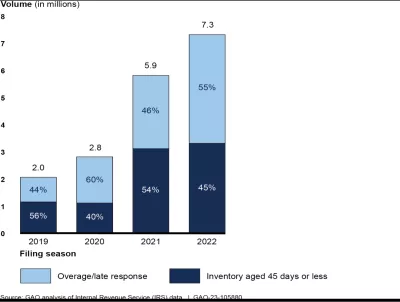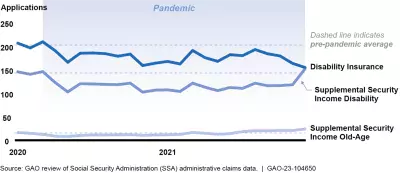Federal Customer Service
Over the past 20 years, federal agencies have been working to improve customer service. For instance, the GPRA Modernization Act of 2010 (GPRAMA) required that agency performance plans measure progress toward customer service goals, including quality, timeliness, and satisfaction. The 2021 President’s Management Agenda included cross-agency priority (CAP) goals, that are required under GPRAMA, related to improving federal customer experience and service delivery. The two prior administrations also designated CAP goals for improvements in these areas.
However, some federal agencies are still not meeting customer needs or making improvements to address customer concerns.
- During the 2022 filing season, the Internal Revenue Service (IRS) struggled with a backlog of work and ongoing hiring challenges. IRS hired necessary staff with the help of a short-term authority that speeds the hiring process. However, most of those staff started working after the filing season ended. As a result, IRS’s 2022 customer service was poor and taxpayer refunds were delayed.
- IRS used a combination of strategies to work through its correspondence inventory, including reassigning staff from answering phones to processing correspondence. However, partly as a result, IRS answered less than 1 in 5 calls during the 2022 filing season. IRS needs to modernize its online “Where's My Refund” application to better serve taxpayers and reduce the burden of additional calls and letters on IRS staff.
IRS Correspondence Inventory and Late Reponses, as of End of Filing Season, 2019-2022
 IRS correspondence inventory and late responses" width="400" height="302" />
IRS correspondence inventory and late responses" width="400" height="302" />
- The Social Security Administration’s (SSA) service delivery was significantly impacted by the COVID-19 pandemic—its field offices were closed to most in-person services from March 2020 through April 2022. This left some vulnerable populations without a viable alternative to apply for certain benefits that are not easily accessible via telephone or online. For example, from March 2020 through December 2021, average monthly applications for low-income Supplemental Security Income (SSI) disability benefits were 18% lower than during the 2 years before the pandemic began. Similarly, fewer Spanish speakers filed applications across multiple benefit programs during the same time. SSA should make SSI and Spanish language applications available online to allow eligible individuals to access needed benefits without relying on scarce staff resources.
Changes in SSA Benefit Claims (January 2020-December 2021)

Recent Reports
Government Performance Management: Actions Needed to Improve Transparency of Cross-Agency Priority Goals

 IRS correspondence inventory and late responses" width="400" height="302" />
IRS correspondence inventory and late responses" width="400" height="302" /> IRS correspondence inventory and late responses" width="400" height="302" />
IRS correspondence inventory and late responses" width="400" height="302" />